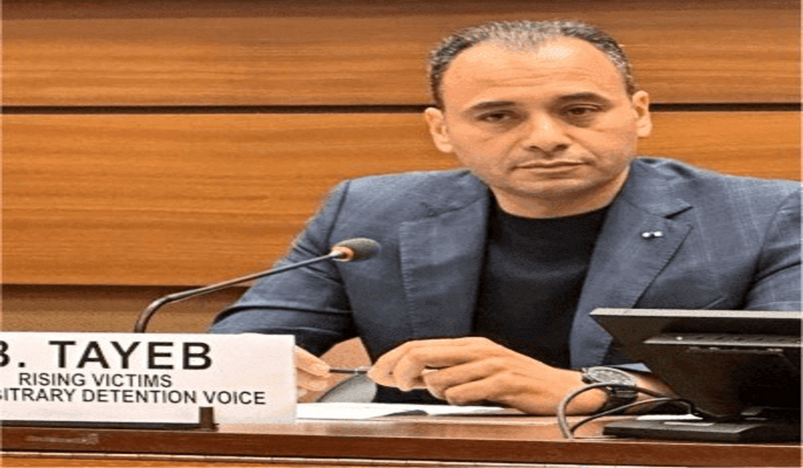
Tayeb Benabderrahmane
On January 13, 2020, Tayeb Benabderrahmane, a French-Algerian businessman, was arrested by Qatari intelligence without legal justification. Held under house arrest for 307 days, he endured intense psychological and physical pressure without access to legal assistance or due process.
The situation worsened when he was sentenced to death by a Qatari court, without charges, trial, or an opportunity to defend himself—a stark example of the lack of judicial fairness in Qatar.
In November 2020, after nearly a year in detention, Tayeb returned to France and began legal action against Qatar, filing a case with the International Centre for Settlement of Investment Disputes (ICSID) and planning further actions to expose these human rights abuses internationally.
His ordeal highlights Qatar’s troubling record on human rights, where arrests and mistreatment reveal a justice system that disregards fundamental freedoms. Tayeb’s fight for justice now seeks to raise international awareness, calling on the global community to hold Qatar accountable and advocate for fundamental rights protections.
Qatar has embarked on an implausible smear campaign accusing Tayeb Benabderrahmane of attempting to sell a telephone belonging to Paris Saint-Germain (PSG) to police authorities in the United Arab Emirates. This accusation, which defies logic and flouts the most elementary principles of law, reveals a desperate attempt by Qatar to justify its own human rights violations.
The UAE Penal Code: an impenetrable wall for Qatari fantasies
The laws of the United Arab Emirates are strict and unambiguous when it comes to theft and receiving stolen goods, as Article 405 of the Federal Penal Code clearly states. This text clearly states that anyone who participates, directly or indirectly, in the possession or acquisition of stolen goods is liable to severe penalties. To imagine for a second that the Emirati authorities, committed to a policy of transparency and rigour, would become involved in a case where they would knowingly violate their own laws is not only absurd, but deeply contemptuous of a State that actively works to ensure compliance with international standards.
Institutional integrity far removed from the practices complained of
The Emirates claim to be exemplary in terms of governance and integrity. Article 234 of the UAE Penal Code explicitly prohibits any form of corruption or compromising act within public institutions. The very notion that an Emirati officer could acquire stolen property shows a total ignorance of the values that the Emirates apply and defend on the international stage. This ridiculous accusation by Qatar demonstrates a complete disconnect with reality.
A political and diplomatic risk that the Emirates would never contemplate
Qatar and the Emirates, as we all know, maintain relations that are often complex and marked by notorious political disagreements. To imagine that the Emirates would take the insane risk of compromising themselves in an illegal transaction to acquire a telephone, and moreover in relation to an institution as high-profile as PSG, is a hypothesis that only deeply malicious minds or those completely out of touch with reality could contemplate. The Emirates have no interest, and even less the audacity, to risk their international reputation in an operation as dubious as the one attributed to them by Qatar.
Confessions obtained under torture: an unworthy and revealing tactic
Tayeb Benabderrahmane's confession, obtained under torture according to several sources, has absolutely no legal or moral value. Qatar, despite being a signatory to the United Nations Convention against Torture, shows flagrant contempt for human rights by resorting to such methods. The allegedly forged signature obtained under duress can only reinforce the feeling of manipulation, a cynical strategy that reflects Qatar's desire to fabricate a guilty party. These barbaric and archaic practices have no place in a world that aspires to justice and respect for human rights.
An accusation that is inconsistent with the Emirates' values of transparency
For years, the United Arab Emirates have invested in being perceived as a model of transparency, integrity and legality. The mere idea that they might engage in a clandestine purchase of stolen property is incompatible with the reality of their policy of transparency. This type of transaction simply reveals Qatar's inability to understand the rigour and credibility of the Emirates, which have absolutely no interest in compromising themselves in illegal acts.
Conclusion: a twisted logic that exposes Qatar to international scorn
The very idea that the Emirates would agree to acquire property stolen by a private individual knowing its illegal origin is so implausible as to be laughable. According to Qatar's reasoning, its own institutions, which are supposed to guarantee public order, would agree to deal directly with sellers of stolen goods, simply because it serves their disinformation objective. This scenario has no place except in the twisted imaginations of those who seek, by any means, to justify their own failure on human rights.
In the final analysis, the Emirates, like any state that respects the law, categorically rejects these absurd and unfounded accusations. This legal soap opera that Qatar is trying to orchestrate, which collapses under the scrutiny of the facts, is nothing more than a masquerade designed to discredit a foreign figure and divert attention from the Emirate's shameful practices.Through this affair, Qatar is revealing not only its desire to manipulate the facts, but also its distressing and perverse conception of justice.
These ridiculous accusations, based on confessions obtained by force and falsification, reflect a crying lack of credibility, a systematic violation of human rights and a desperate flight by the Qatari state in the face of its own declining image.
.jpg)
Qatar Secures Place Among the World's Top 10 Wealthiest Nations
.jpg)
Hamad International Airport Witnesses Record Increase in Passenger Traffic

Saudi Arabia: Any visa holder can now perform Umrah

What are Qatar's Labour Laws on Annual Leave?
Leave a comment